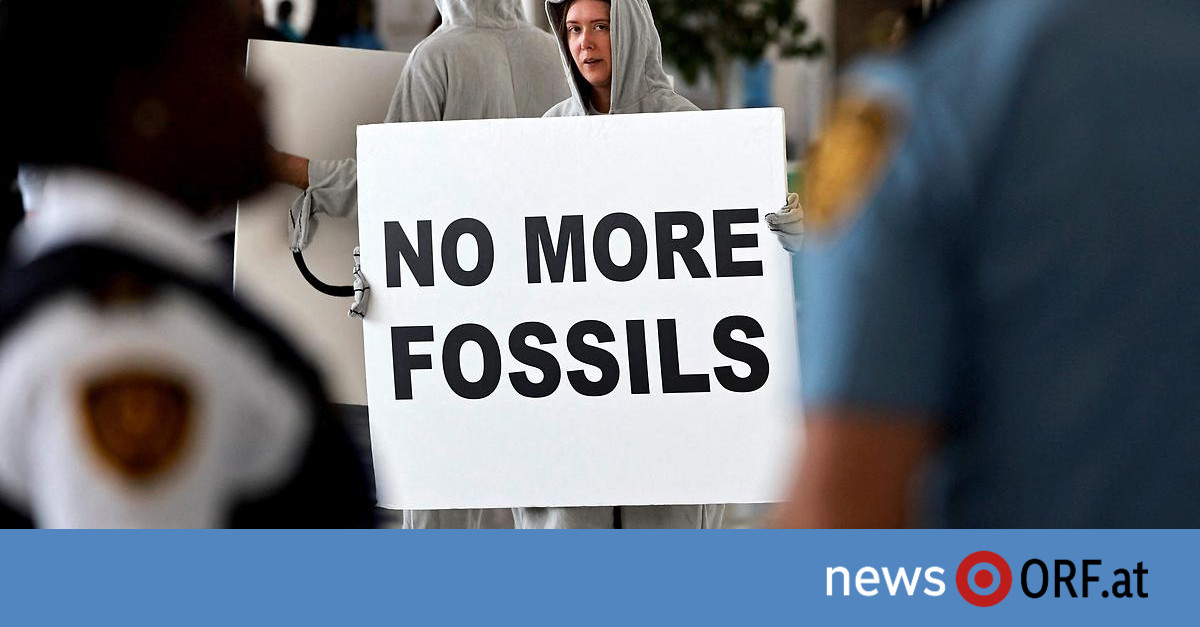The general manager said the criticism was expected. “In fact, we wanted the text to stimulate conversation – and that’s exactly what happened.” There are very different viewpoints, especially when it comes to language around coal, oil and gas.
There are three possible versions available for the final declaration: “phasing out,” i.e. a complete exit from fossil energy, a watered-down version that stipulates a reduction (“tapering”), and “unrelenting” — which means something like this. Using technologies such as carbon capture and storage (CSS). But an alternative that does not provide for a move away from oil, coal and gas is also possible.
“Historical formulation,” she promised.
The phase-out of fossil fuels demanded by more than 100 countries was no longer mentioned in the draft as of Monday evening – unlike previous versions. Instead, the version envisages “reducing and promoting the use of fossil fuels.” This should happen in a “fair and orderly” manner in order to achieve greenhouse gas neutrality “by or before 2050.”
The European Union, the United States and dozens of other countries rated the draft as disappointing and insufficient. It is a “bitter setback,” Jasmine Doerger, a climate and energy expert at Greenpeace Austria, told ORF.at. WWF Austria described the draft “global inventory” as disappointing. It does not send “a clear political signal that should come from this climate conference,” WWF spokesman Thomas Zeitner said.
World climate conference
The Conference of the Parties (COP) brings together the European Union and the 197 participating countries that signed the UNFCCC in Rio de Janeiro in 1992. The COP is held each year in a different city, and two-week negotiations work out the text of the resolution.
“Worst formulation ever”
The former head of the Secretariat of the Intergovernmental Panel on Climate Change, Renate Christ, said on Tuesday, as part of a discussion project organized by the press conference of the scientific network “Diskurs”.
The move is “completely disappointing” and at the moment she cannot say what negotiators should do with “this wholly inadequate document.” However, even if an unsatisfactory final text is reached, Christ points out options for action. “Even if the newspaper says something different, I hope the countries themselves will take action,” Crist told ORF.at.
In the last few meters he “runs out of air”
The Swedish director-general said that before Monday it was not known exactly where each country’s red lines were. Comments were collected by Tuesday morning. He added: “This enables us to publish a new draft text.” “This includes including language relating to fossil fuels in the text wherever possible. This would be historic. But ultimately the responsibility lies with government delegations and how ambitious they really are when it comes to climate protection.”
Mayer (ORF) at the climate conference
Günter Mayer analyzes what has happened in Dubai so far: The dispute over the phase-out of fossil fuels is still keeping the climate conference on its toes.
Reinhard Mishler of the International Institute for Applied Systems Analysis (IIASA) in Laxenberg told a news conference that he expected the COP to be extended by a day or two. Regarding “losses and damages,” that is, financial compensation for countries affected by climate change, Mishler identified an “ambitious start” despite some scandals. But now “the air is running out and the will is missing”, especially when it comes to adaptation goals – more on this at science.ORF.at.
Resistance from major oil producers
While scientists insist that climate goals cannot be achieved without a complete phase-out of “fossils,” and the United States and the European Union also speak out in favor, growing resistance has taken shape in recent days among members of the United Nations. Petroleum Exporting Countries (OPEC)…
It was said on Saturday that several OPEC members appeared to want to veto the inclusion of such an exit in the new climate agreement. For example, Saudi Arabia, the largest OPEC producer, along with Russia and other countries, have argued that the focus of the UN Climate Change Conference (COP28) should be on reducing emissions rather than targeting the fuel sources that cause them.
Protest action before the World Climate Conference
COP28 is being extended in Dubai. Many countries rejected the submitted draft resolution because it did not include a shared commitment to phase out all fossil fuels globally. To demand more ambitious decisions, NGOs organized a protest.
A day before the scheduled end of the conference, UN Climate Minister Simon Steele called on negotiators from nearly 200 countries to end any “unnecessary tactical blockade.” Steele said the tactics used in Dubai must end. Negotiators must agree on the most ambitious decisions; Every step backward would “cost untold millions of lives.”
COP28 president under pressure
This year’s climate conference was dominated by debate about the future of fossil energy, which got its president into trouble. Current COP president Ahmed Al Jaber, who also heads state oil company Abu Dhabi National Oil Company (ADNOC), has come under pressure over the investigation by the British newspaper The Guardian and the Climate Reporting Centre.
They reported that Jaber said in a video call with United Nations representatives in November that there was “no science” to prove that phasing out fossil fuels was necessary in order to reduce global warming to 1.5 degrees compared to the maximum of the pre-industrial era.
Jaber strongly rejected the criticism and felt that he was misunderstood. He always emphasized that it was necessary to “keep a target of 1.5 degrees within reach.” He wants to work with everyone and “create a plan that is workable, actionable, realistic, practical and gets real results.” For many participants, the United Nations Climate Change Conference (COP28) can only be considered a success if it actually leads to an agreement on exiting all fossil fuels, writes the American channel CNBC.

“Total coffee aficionado. Travel buff. Music ninja. Bacon nerd. Beeraholic.”








More Stories
Coral Seeding: Artificial Insemination Makes Coral More Heat Tolerant
Fear, Anger, and Denial: How People Respond to Climate Change – Research
LKH Graz: Using radiation to combat heart arrhythmias